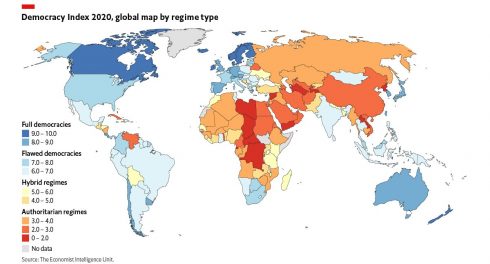In case you missed it…
Will 2018 be the year when the US does something about being a favorite destination of oil magnates and money launderers? Despite legislation to register beneficial ownership in Congress, the odds are not good. The Bloomberg Editorial team are worried that the US is becoming the world’s top tax haven, “demanding [transparency] standards from the rest of the world that it refuses to apply to itself.” Congress refuses to make changes in the tax code that would compel US banks to reveal information on foreign beneficial owners, despite requiring it of others and has not adopted the Common Reporting Standard.

Photo credit: Pixabay
Does this have consequences? Yes. Just before the holidays, TAI members were debating the different tax and anti-corruption motivations for more transparent tax regimes and beneficial ownership disclosures. To complement, faith leaders offer their take, while Clay Fuller lays out national security arguments to tackle an estimated $300 billion of illicit financial flows introduced into the US economy every year. In Africa, illicit flows affect domestic resource mobilization, as this collection of essays indicate. Civil society are using similar arguments to urge action from ESCAP in the Asia context. Alex Hilling and Daniel Ostas unpack the formalistic versus fairness approaches of companies to paying taxes in their upcoming book – at least the existence of a book on tax and corporate responsibility is a positive sign of the times.
Combining fake news and bitcoin = TAI Weekly gold. Bitcoin already requires cutting through the hype but this is definitely a case of not believing all you read. Makes the case for making fact-checking compelling. Here are initiatives from Italy and Kenya that should inspire on what’s possible. More examples could soon come from France given President Emmanuel Macron’s commitment to fight the spread of “fake news” through increased transparency in internet platforms. What’s definitely not fake – a trend to crypto-grants. In 2017, donors have given away $22 million in bitcoin. They may want to spend fast.
Why is corruption important to inclusive development? Christine Lagarde of the International Monetary Fund lays out the reasons and shares IMF’s roles and plans in reducing corruption heading into 2018. What about using data to fight corruption in the extractives sector? Check how in this three-part webinar series by Omidyar Network investees. Meanwhile, Brazil’s state-run oil company Petrobras agreed to pay $2.95 billion to settle US lawsuits alleging its top executives of corruption in the contracting process. What they may worry less about is their tax burden. While we were busy ushering in the new year, oil and gas companies in the US were given another tax break, worth around $500 million annually and undercutting what was the primary source of revenue for an oil spill liability trust fund. Striving for optimism, the Publish What You Pay (PWYP) team recaps the year in the fight for transparency.
How to tackle poverty with data? Using the IATI case, Nadine Valat explains how the availability of up-to-date comprehensive and forward-looking data allow countries to plan and allow citizens to hold governments to account. For more shorter reads on open government, the OGP has partnered up with Carleton University for a blog series written by students enrolled in the Open Government and Communication course. If you fancy a longer read, a new book assessing the proliferation of open government initiatives from different parts of the world might pique your interest.
Key to an impactful open government? A culture change within public service that would allow elements of open government to happen. Anna Hum talks about how Canada is doing it. In Pakistan, more work needs to be done, as evidenced by this comparative analysis of RTI laws in the country.
Talking of culture, according to the Open Data Institute open culture, open data and open source code are essential to take advantage of innovation in artificial intelligence. How to mitigate risks, which includes protecting privacy and security? The UK government hope that “data trusts” may help as they invest in AI and data access.
Numbers of the week – 8, 1 and 10. In what appeared to be a massive citizen data breach in India, $8 has allowed a reporter to gain access to sensitive information of over a billion Indian citizens in just ten minutes. Perhaps, the Indian authority in charge of the Aadhaar database should have checked its digital security. Gain tips from TechSoup on how to protect your organization’s data security.
And while countries such as UK and China have started to harness the potential of AI, the rest of the world still grapple with the basic problem of internet access. An interview on The Guardian with a start-up founder in Nigeria dives deep into how broadband could “lift” Nigeria. Certainly, more might then be able to make the most of online public data. Where to get tips? This podcast offers insights from participants in the African Open Data Leaders Network.
In 2017, we witnessed a number of solidarity movements – not least in the US, from the #NoMuslimBanEver to #BlackLivesMatter. Luminate asks –what makes an effective solidarity practice? How do you move from working in silos into building solidarity movements? Still on civic participation, Juliane Oram and Deborah Doane, worry that the ‘new normal’ among funder “is simply to re-configure grant programs to ensure that they do not fall afoul of new national laws.” Drawing on a European Foundation Centre report (featured in a past Weekly), they call for more proactive push back and advocacy against closing space, or fear funders “are limiting partnerships and maintaining a distance between the more outspoken spectrum of development and human rights actors.”
What makes for a positive relationship between funder and grantee? Program officers who display an “understanding of grantees’ work and the context within which they operate; a commitment to transparency about the grant-application process; and a disinclination to pressure nonprofits to alter approaches or proposals to win grants.” So says a new report by the Center for Effective Philanthropy. Hear direct from some of the officers who received top marks in the underlying survey.
One other way to win grantees’ hearts? Ensure they have time to learn. Making All Voices Count grantee experiences suggest grantee autonomy and connection to the local context are enabling factors for adaptive learning, but amid so many pressures, donor demands and grant-making cycles can have a significant influence on investment in learning and adaptation.
And if your new year’s resolution includes learning more about collaborating, learning and adapting, you and your colleague might want to join USAID’s challenge week. One of the assignments is to spend a few minutes each day reading about your technical sector and revisiting your theory of change. You may also want to read on evidence-based foreign assistance programming.
Curious who made it in the philanthropy sector in 2017? Check out the roster of Inside Philanthropy’s Philanthropy Awards. It might provide some inspiration for the coming year, which might be needed considering a projection that the Trump administration’s new tax law could potentially lead to an annual $20 billion drop in charitable giving. And to end our first issue of the year – here are the ten things children born in 2018 will probably never experience. No digital insecurity? Seems positively utopian.
As we wrap up our 2018 work planning, the TAI team are looking forward to an interesting and jam-packed year. Finding concrete opportunities (big and small) for our members to collaborate is top priority, but that will be mixed in with some blue sky thinking – what might fiscal transparency and accountability look like in 2030 (anyone?) – and a push for adaptation in donor grant making practice, not least testing aligned reporting requirements. Don’t hesitate to let us know your hopes/priorities for the year ahead!

The TAI team – Michael, Alison, Lauren and <inserts Ava of Communications>, planning for 2018.
Tai spotlight…
- Meet DFID’s New Head Economist | DFID – Rachel Glennester talks about her work on randomization and evidence in development and her plans within DFID
- Assessing Nonprofit Capacity: Tools That Can Help | William and Flora Hewlett Foundation – Excerpts from an interview with Hewlett’s Jennifer Wei and Prithi Trivedi, on lessons gleaned from the research on organizational assessment tools. What are the implications for funders and grantees?
- The Continuing Evolution of Omidyar Network – A look back at Omidyar Network’s beginnings and its plans for the coming months
- Landing a Helicopter on a Handkerchief | DFID – For the past four years, the UK has been delivering on its commitment to spend 0.7% of GNI to aid spending. It’s a complex process. So how does DFID lead this process across government?
- Bridging the Gap: Rebuilding Citizen Trust in the Media | Open Society Foundations – OSF commissioned a study on how media build trust and engage with readers. What are the key findings?
- Privacy in Cyber Space | Omidyar Network – ON’s team on digital identity dives deep into India’s proposed data protection framework
Of potential interest…
- Power Plants Use Water, But We Have No Idea How Much – World Resources Institute develops a method to calculate power plant water usage to bridge information gap
- Facebook Says It Is Deleting Accounts at the Direction of the U.S. and Israeli Governments – After meeting with Israeli government, Facebook deletes Palestinian accounts on grounds of “incitement”
- Why Does Identity Matter? – How does digital identity save and improve lives?
- Mark Zuckerberg Says Facebook to Look Into Cryptocurrency and Makes a Personal Pledge to End Misuse of Facebook in 2018 – Facebook founder focusing on protecting the Facebook community and defending against interference by nation states, but still plans to look into cryptocurrency. What would this mean for the digital currency world?
- Humanitarian Group Uses Blockchain Tech to Give Rohingya Digital ID Cards– Blockchain to give the most disenfranchised minority group access to public services
- No Masks or Capes, But These Heroes Are Saving the World – Who inspired Bill Gates in 2017?
- Are Algorithms Building the New Infrastructure of Racism? – How we use data can reinforce or maybe fix social tensions.

Calls: Proposals, papers and course invites
- The Partnerships for Enhanced Engagement in Research (PEER)– January 12, 2018
- Advocate Europe –January 16, 2018
- Application to Conduct Lit Review on the Effects of E-Governance Programs for USAID– January 28
- Natural Resources for Sustainable Development: The Fundamentals of Oil, Gas and Mining Governance (facilitated MOOC) – February 5
- ICFJ Knight Fellow, Data Journalism, Central/Eastern Europe
On the calendar…
- Predict-a-palooza: Civil Society Forecast 2018 (webinar)- January 11
- Measuring the Hard to Measure in Development (webinar) – January 16
- EGAP: Elections and Political Accountability Metaketa research and findings – January 18 (Stanford, California, USA)
- Fighting Corruption in the Extractives Industry (webinar) – January 23
- USAID CLA Challenge Week – January 22- January 26
- Blockchain for International Development (online course) – January 22 -February 16
- On Think Tanks Conference – Feb 13-18 (London, UK)
- Taxation and SDGs – First Global Conference of the Platform for Collaboration on Tax – Feb 14-16 (New York)
- Data on Purpose: The Promise and Pitfalls of the Connected World – February 15-16 (Stanford, CA)
- Conference on Fairness, Accountability and Transparency – February 23-24 (New York, USA)
- Open Data Day 2018 – March 3 (Global)
- Innovations in Participatory Democracy Conference – March 8-10 (Phoenix, Arizona, USA)
- Collective Impact Convening– April 3-5, 2018 (Austin, TX)
- A Return to ‘Governance in Dark Times’? Creating Spaces for Citizen Dialogue, Encouraging Engagement in Public Life, and Ensuring Government Transparency and Accountability – April 12-14 (Orlando, Florida, USA)
- TicTec 2018: The Impacts of Civic Technology Conference– April 18-19 (Lisbon, Portugal)
- RightsCon (human rights in the digital age) – May 16 – 18 (Toronto, Canada)
- International Anti-Corruption Conference – October 22-24 (Copenhagen)



